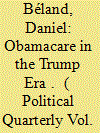|
|
|
Sort Order |
|
|
|
Items / Page
|
|
|
|
|
|
|
| Srl | Item |
| 1 |
ID:
187435


|
|
|
|
|
| Summary/Abstract |
Due to the centrality of education to economic growth and social development, successive governments in post-colonial Ghana have implemented policies to improve the quality of education in the country. In line with this, Ghana embarked on its first major education reform in 1987 under the Provisional National Defence Council (PNDC) government. While several studies have been conducted to explain this reform, these studies have largely been descriptive and theoretically, have over relied on the conditionality thesis. Our study draws on ideational literature and research interviews to offer an alternative explanation of the 1987 reform. Drawing extensively on the ideational concepts of bricolage and translation and focusing on the actors using these two mechanisms, the study argues that, while exogenous forces did impact the 1987 reform, it was mainly driven by endogenous factors featuring both path dependent and departing changes.
|
|
|
|
|
|
|
|
|
|
|
|
|
|
|
|
| 2 |
ID:
162005


|
|
|
|
|
| Summary/Abstract |
DANIEL BÉLAND, ANAHELY MEDRANO, and PHILIP ROCCO investigate how social policies adopted at the substate level in Canada, Mexico, and the United States impacted policy reform at the national level. Their comparative analysis sheds light on the role of institutional structures and policy networks in shaping what they call “bottom up” social policy diffusion.
|
|
|
|
|
|
|
|
|
|
|
|
|
|
|
|
| 3 |
ID:
162598


|
|
|
|
|
| Summary/Abstract |
The Patient Protection and Affordable Care Act, better known as Obamacare, is the most significant US social policy reform in half a century, and the most politically fractious. Since the law was signed by President Obama, Republicans have mobilised against it, using courts and state governments to undermine the implementation of the legislation, which was set to unfold gradually over a nine‐year period. As we describe in this article, however, the beginning of the Trump presidency in January 2017 marked a turning point in the politics of Obamacare. In the absence of Obama's veto, legislative retrenchment became a viable option for the first time. Yet, a combination of intra‐party conflict and opposition to repeal from key stakeholders doomed Republicans’ initial efforts. Nevertheless, we discuss several reasons to doubt Obamacare's political stability.
|
|
|
|
|
|
|
|
|
|
|
|
|
|
|
|
| 4 |
ID:
130536


|
|
|
|
|
| Publication |
2014.
|
| Summary/Abstract |
The most populous country in the world, China faces immense socio-economic challenges providing adequate pensions to its growing elderly population. In that country, pensions available to older people vary considerably across the country's various pension schemes. This paper calculates the fairness coefficients of these pensions based on pension income, contributions, demand, and generational gap. The analysis shows that the pension fairness coefficients are 0.53, 0.38, 0.95, and 0.82, respectively. Synthesizing pension income, contributions, demand, and generational gap, the paper suggests that, in China, old-age pensions across different schemes are absolutely unfair. Finally, it analyzes the superficial and deeper factors behind pension unfairness in China before providing policy recommendations for improving the fairness of the country's pension system.
|
|
|
|
|
|
|
|
|
|
|
|
|
|
|
|
| 5 |
ID:
182531


|
|
|
|
|
| Summary/Abstract |
In the aftermath of the global COVID-19 crisis, whereas many world leaders enacted swift lockdown orders and robust testing regimes to preserve public health and to speed up economic recovery, Donald Trump in the United States and Jair Bolsonaro in Brazil responded to outbreaks by publicly downplaying the significance of the crisis and argued that overly restrictive health measures would create too sizable an economic risk. These two presidents have done much to weaken democracy and trust in government. In this article, we examine the extent to which two institutions in each country––federalism and the party system––impacted the ways in which they framed the COVID-19 crisis and policy responses to it in 2020, especially during the first months of the pandemic. Our evidence suggests that each of these institutions provided opportunities for both leaders to reconstruct public understandings of the crisis while deflecting blame for negative public-health outcomes.
|
|
|
|
|
|
|
|
|
|
|
|
|
|
|
|
|
|
|
|
|